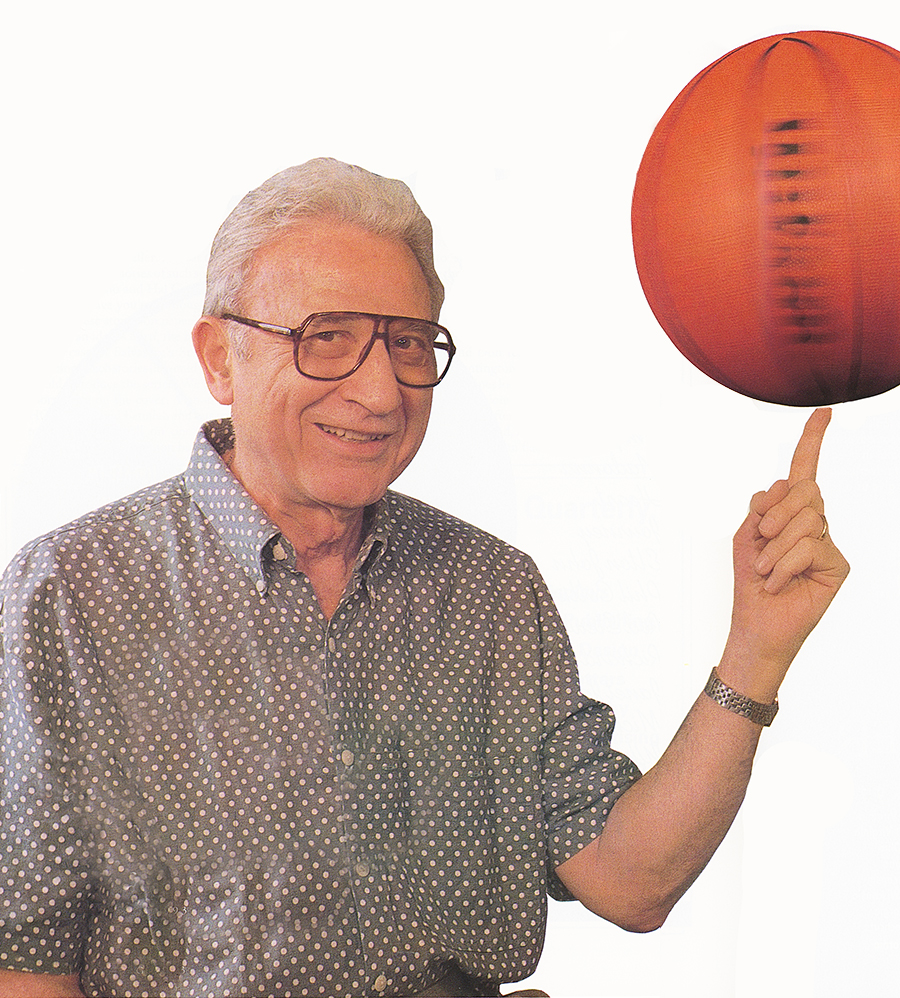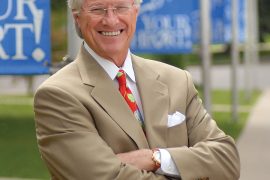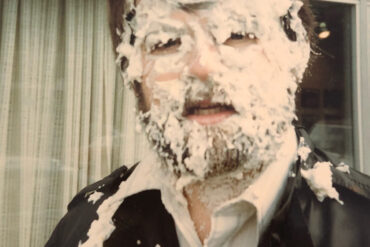In part one of a series on legends of the game, Huntington sports writer Ernie Salvator remembers the career of golfer William C. Campbell
By Ernie Salvatore
HQ 14 | SPRING 1993
Choosing Bill Campbell as my companion on this, the first in a series of trips down memory lane for readers of the Huntington Quarterly, was easier said than sinking a four foot bogey putt. Downhill.
In my half century of sports writing, no one exemplifies Mr. Braun’s profundity better than Bill Campbell does; and believe me, I’ve bumped into enough lunkheads, poseurs and frauds to know the difference. Not so with Bill, whose strength of character and respect for the game he still plays so well at 70 remain his strongest allies in his part-time career as a world-class amateur. I say part-time because that’s exactly the place golf holds in his life – that of a hobby, albeit a rather expensive one, that he manages to sandwich around the meat of his existence as an insurance executive.
Remarkably, neither his golf nor his business has been adversely affected. In the former, his roll call of 3 3 tournament championships certainly testifies to that, particularly the three USGA (United States Golf Association) National championships. He’s the only Huntington-born athlete, in any sport, to have won that many national titles; and he’s still the only one to win back-to-back USGA Senior Amateurs. Two of his 33 victories came on foreign soil. He could have one or two more with a nod from Lady Luck, a fickle dame if there ever was one. This is why I suspect Bill Campbell has never been convinced that in his prime he belonged in a class with the world’s greatest amateurs – including the sainted Bobby Jones, Francis Ouimet and Chick Evans.
Consider, please, as evidence, his unbeaten record in Walker Cup singles play against Great Britain’s best. He shows straight victories and one tie – still a record high in the international series that now matches America’s best amateurs against those from the United Kingdom and Europe. Of course, the legendary Bobby Jones was also unbeaten in his Walker Cup singles matches, but The Emperor only played five so, naturally, Bill was once moved to say, “I guess I’m lucky Bobby didn’t play in eight Walker Cups before he retired.”
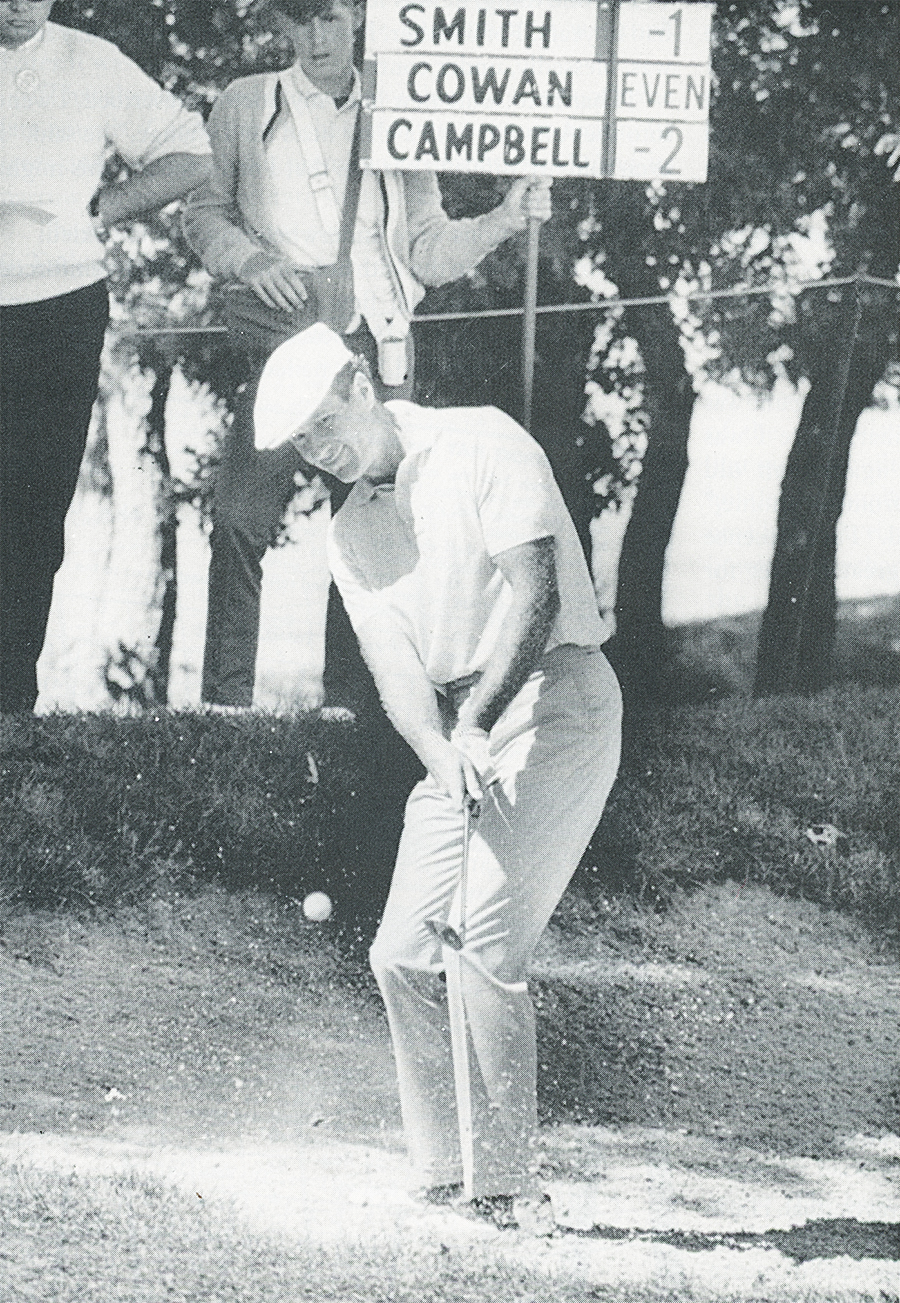
Such modesty in this era of enormous egos isn’t a put-on. It’s Bill Campbell’s refreshing style. His persona. His trademark. Since he first swung a club. Win or lose. His credo commands that one is always gracious to one’s opponents. Demean them and you demean defeating them. Shake their hands. Pat ’em on the back.
So it came as no surprise to me 29 years ago next September that, in the aftermath of his first major victory, the toughest man to convince that Bill Campbell had really won the 1964 U. S. Amateur at Canterbury was Bill Campbell himself. In fact, it wasn’t until the messages of congratulations were still pouring into his office on 11th Street from all over the globe four days after his 1-up triumph that he began to weaken. The picture of him pointing to a fresh stack of mail on his desk early on Day Four remains as vivid in my mind as if it were yesterday. Shaking his head in wonder he quipped, “Each one that comes in is a fresh reminder that it DID happen. And, do you know, I’m beginning to believe it.”
Well, if it really took Bill four days to accept the reality of his triumph, maybe he had a valid excuse, given the direction his golf career had been taking. Major championships somehow were slipping through his hands too often, and at the last possible moment.
“I was putting together the greatest runner-up record in the history of amateur golf,” he reflected that day, kicking off two such defeats in the Canadian Amateur, another in the British Amateur, plus two frustrating semifinal efforts in the U. S. and the British Amateurs as well.
But, finally, at age 41 and on his 21st try, Bill changed the pattern, and won it all, albeit under the unique, if unnerving circumstance that his opponent was Ed Tutwiler, the fabled King Tut, his nagging West Virginia nemesis and friend who, the folks back here in Almost Heaven were whispering, owned two things – a Cadillac agency and Bill Campbell. In their 10 previous meetings Tut, virtually an unknown outside West Virginia, won seven, and all seven were in the 36-hole West Virginia Men’s Amateur finals at the Greenbrier. Surprisingly, therefore, Bill said he was relieved at the time – and believes, in retrospect, he would be today – that he couldn’t have drawn a more comfortable opponent, regardless of Tut’s wide 7-3 margin in their personal series. Sound crazy? Not quite. Tut’s name did send a pang or two through his tummy.
“I do recall that when I reached the final I had a phone call from the Charleston television station the night before the match and was asked how I felt. I said, ‘Well, how would you feel if all your competitive life you found yourself in a struggle with a guy who made a career out of beating you? And after 21 tries for the U.S. Amateur yourself, you finally get to the final and who do you find there in the opposite bracket but the same guy who’d been beating you so often.”‘
But Tut also represented an up side.
“Instead of playing a stranger whose game was unfamiliar, there I was going against an old friend from back home,” Bill said. “Tut’s presence was a great pacifier for me.”
And a great motivator. After all, vengeance has its place – on a golf course, that is.
So, Bill went into the match enveloped in what he described as a “massive calm,” although he was aware of the many inaccuracies that had been read into the rivalry, and that some hidden bitterness might exist in the Campbell camp because of Tut’s domination.
“But, it simply wasn’t true,” Bill said. “Certainly, we were rivals on the golf course. But most of all we were friends. Why, we roomed together at other tournaments and we also tried to help each other with our games. In 1957, when I won my fourth North-South at Pinehurst, it was Ed who helped me correct some putting faults.”
Bill neglected to point out that the help was mutual. He, in turn, had been mainly responsible for helping Tut take his golf career beyond West Virginia’s borders.
Also, many of the misconceptions had focused on the contrasts in their styles and temperament. Bill was the calm, steady, meticulous shot-maker, King Tut was his opposite – a garrulous, cigar-chomping scrambler, a man of a million miracles who claimed “It’s better to be lucky than good.”
Campbell had learned how to cope with Tut’s mind games and, besides, he was heartened by a series of subtle, tell tale portents of good fortune that had been hinting at a victory all week. Or so he thought.
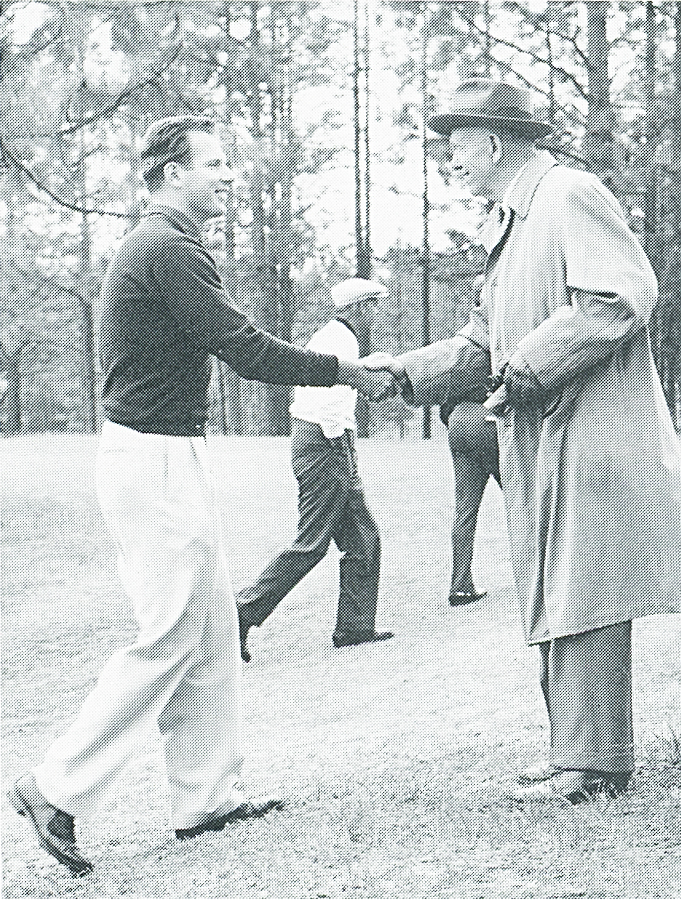
For one thing, he was feeling physically stronger than he had in years. For another, his chronic late summer hay fever was, blessedly, under control.
“Thanks to some new juice my doctor prescribed, I went into the Amateur with a clear head for a change,” he said. “I even told my wife and parents that I had a feeling this might be my year to win.
“Their reactions were underwhelming,” he chuckled.
A miracle shot on the 18th hole of his first match reinforced his conviction. The ball flew off his club soaring toward disaster when, suddenly, it took a strange, almost mystical bounce off a directional sign nailed to a tree, thence on to the green where Bill closed out the match.
Another “sign” was the decision of a sportswriter to “stay with me after the second day because (he said) I was going to win it,” Bill said. “I didn’t know this fellow – I’d never heard of him. And, after 29 years I’ve forgotten his name. Yet, for some stranger reason he picked me. I’m thankful he made the right pick.”
“We’d had only one hot day all week,” Bill said “ and at my age (41) that helped. Early in the tournament it was cool. Later it was wet.
“That also explained why so many older players were in the late rounds. Canterbury’s character was another factor. Its trees and doglegs put a premium on experience.” And its narrow fairways on accurate shot-making.
These were virtues not rooted in Tut’s erratic arsenal, as subsequent events proved.
And then there was Bill’s set of accidentally heavy clubs – the irons he’d won for being the low amateur in the 1963 State Open. So, Bill pulled a refinished driver out of his locker and “sent it to the factory with orders to match the irons and a spoon with it.
“The driver was heavier than I thought. But when the new set came back they were all much heavier than what I had been used to.” Fortunately, the heavier clubs, plus hours of practice correcting a flaw in his backswing, gave Bill greater control over his shots through the grueling, two-a-day, early matches.
In the morning round of the championship final, however, it looked like Bill’s “lucky signs” were a cruel deception and King Tut would prevail again. Blasting out of traps, bouncing the ball off trees and surging out of the rope-like rough, Tut quickly built a three hole lead through the first nine holes. At that point, however, the character of the match began to change. Campbell launched a rally and finally caught Tut at the 17th. They went to lunch all even.
In the afternoon the now tense struggle saw the two old antagonists fighting it out, stroke for stroke, like a couple of heavyweights. Only three holes were won, one by Tut, the 27th, when he went 1-up again, two by Campbell, but Bill saved his for the 34th and 35th, which proved to be a pivotal hole.
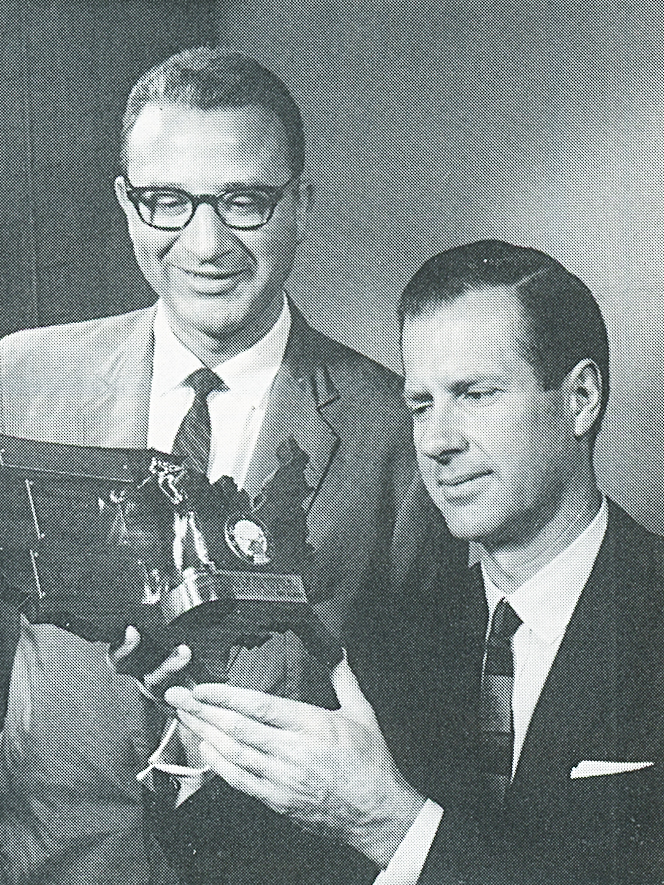
On the 35th, a 215 yard par 3, both missed the green, Bill’s ball landing 45 feet to the right, Tut’s 75 feet short-unusual for the aggressive Tut. And, for the first time he seemed to be cracking as he overshot the green badly on his next shot before chipping back to within 20 feet. But he two-putted for a bogey. The hard way.
Bill, meanwhile, had carefully chipped his ball onto the green, rolled it softly to within four feet of the pin. Then he ran it in, pretty as you please, tipped his cap, and went 1-up. The lead held on the 435-yard, par 4 No. 36, which they halved with bogey 5s. The first major championship, Bill had sought for so long, was his when Tut two putted from 11 feet.
“Unbelievable,” was Bill Campbell’s first word as the new champion. Looking back 29 years later he said it was still “unbelievable.”
As you can see, he does take a lot of convincing.
THE CAMPBELL RECORD
1941 : Eastern Interscholastic Champion
1943, 1946: Eastern Intercollegiate Champion.
1948-49: Tam O’Shanter World Amateur Champion
1949-1975: 15 time winner of the West Virginia Amateur
1950, 53, 57, 67: North-South Amateur Champion
1950, 53, 55: West Virginia Open Champion
1952, 54, 65: Canadian Amateur Runner-up
1954: British Amateur Runner-up
1956: Mexican National Amateur Champion
1964: U.S. Amateur Champion
1965: Pine Valley Crump Cup Champion
1967: Ontario Amateur Champion
1979: U.S. Senior Amateur Champion
1986-87: U.S. Senior International Team Captain
Member of 8 America’s Cup teams Captain 1956
Member of 8 Walker Cup teams
Singles record 7-0-1 Captain 1957
Member World Cup teams 196 Captain 1986
President United States Golf Association
Captain Royal & Ancient Golf Club of St. Andrews, Scotland
Member West Virginia Sports Hall of Fame
Member PGA World Golf Hall of Fame 1990

